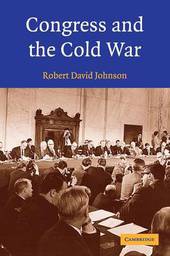
|
Congress and the Cold War
Paperback / softback
Main Details
| Title |
Congress and the Cold War
|
| Authors and Contributors |
By (author) Robert David Johnson
|
| Physical Properties |
| Format:Paperback / softback | | Pages:382 | | Dimensions(mm): Height 229,Width 153 |
|
| ISBN/Barcode |
9780521528856
|
| Classifications | Dewey:327.73009045 |
|---|
| Audience | | Tertiary Education (US: College) | | Professional & Vocational | |
|---|
| Illustrations |
Worked examples or Exercises
|
|
Publishing Details |
| Publisher |
Cambridge University Press
|
| Imprint |
Cambridge University Press
|
| Publication Date |
21 November 2005 |
| Publication Country |
United Kingdom
|
Description
The first historical interpretation of the congressional response to the entire Cold War. Using a wide variety of sources, including several manuscript collections opened specifically for this study, the book challenges the popular and scholarly image of a weak Cold War Congress, in which the unbalanced relationship between the legislative and executive branches culminated in the escalation of the US commitment in Vietnam, which in turn paved the way for a congressional resurgence best symbolized by the passage of the War Powers Act in 1973. Instead, understanding the congressional response to the Cold War requires a more flexible conception of the congressional role in foreign policy, focused on three facets of legislative power: the use of spending measures; the internal workings of a Congress increasingly dominated by subcommittees; and the ability of individual legislators to affect foreign affairs by changing the way that policymakers and the public considered international questions.
Author Biography
Robert David Johnson is a professor of history at Brooklyn College and the Graduate Center of the City University of New York. He has published three books: The Peace Progressives and American Foreign Policy (Harvard University Press, 1995); Ernest Gruening and the American Dissenting Tradition (Harvard University Press, 1998); and 20 January 1961: The American Dream (DTV Press, 1999). He is the editor of a fourth book: On Cultural Ground: Essays in International History (Imprint Publications, 1994). Professor Johnson has published articles or essays in Diplomatic History, Journal of Cold War Studies, Oxford Companion to American History, International History Review, and Political Science Quarterly, among others.
Reviews"For decades, historians and political scientists have ignored the pivotal role of Congress in shaping the politics of the Cold War. They will no longer be able to do so. By redefining congressional power, and revealing the numerous ways through which legislators pushed and pulled national defense policies, Johnson offers an exciting, well-researched, and first-rate piece of political history. This outstanding work should be on the bookshelves of everyone who is interested in the story of American politics since WWII." Julian Zelizer, Boston University and author of The American Congress: The Building of Democracy "Robert David Johnson explodes the myth that Congress took a backseat to the presidency during the Cold War. His sweeping panorama of second half of the twentieth century portrays a feisty institution that seriously questioned and challenged the diplomatic and military policies of a succession of presidents. Here is an astute analysis of our system of checks and balances." Donald A. Ritchie, author of Reporting from Washington: The History of the Washington Press Corps "A necessary addition to all college and university libraries." -- Choice "Robert David Johnson has produced a carefully argued and through reassessment of the role played by Congress...This is a fascinating volume:it throws considerable light on the workings of the Constitution." Peter Lowe, American Historical Review "A notably detailed and accomplished history of much that unfolded on Capitol Hill with great significance for U.S. policies abroad...it moves scholars closer to being able to construct a genuinely balanced history of the U.S. governments relations with its allies, rivals and enemies during a tense era." Davis M. Barrett, Journal of Cold War Studies "Congress and the Cold War is clearly an exceptional piece of historical research, ably addressing in its broad sweep such additional topics such as the critical role of personalities, the turf wars among several important committees...and the double-edged sword of increased House influence in foreign affairs." Dennis M. Foster, The Review of Politics
|